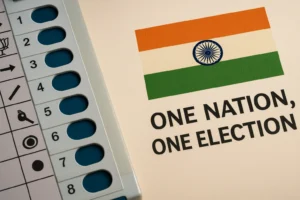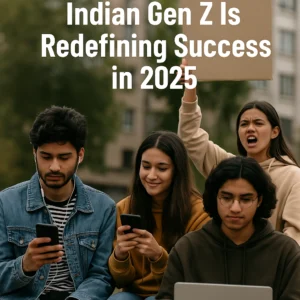Why India’s Youth Are Turning Away from Government Jobs

A young man reflects on the emotional and academic stress while preparing for government jobs in India.
Government jobs India once symbolized everything a stable career should offer—security, social standing, and a steady income. But for many of today’s young professionals, those benefits no longer outweigh the years of preparation, delayed results, and rigid hierarchies. They’re seeking work that aligns with their skills and aspirations—not just outdated promises. Walk around any of India’s old coaching hubs—Prayagraj, Mukherjee Nagar, Kota—and you’ll still hear the clatter of chalk on whiteboards and teachers shouting formulas through noisy ceiling fans. The dream of government jobs India hasn’t disappeared. But it’s different now. Quieter. Not quite as romantic as it once was.
Among the young, the pull of a sarkari naukri just doesn’t carry the same charge anymore.
Table of Contents
The Aspirational Gap Is Widening
A decade ago, government jobs India symbolized stability, respect, and security. Parents would beam with pride if their child cleared the civil services—even if it took them half a decade. That image, though, is fading.
Today’s youth aren’t chasing pensions—they’re chasing purpose.
Twenty-two-year-olds in Bengaluru are building mobile apps and earning six figures in six months. Others are working with international teams remotely or growing YouTube channels. Meanwhile, aspirants preparing for government jobs India are still poring over textbooks from 2015 and wondering if their exam dates will even be announced. Despite their long-standing reputation, government jobs India are struggling to keep pace with the evolving ambitions of the younger generation. The roles often feel disconnected from real-world skills, offering little room for innovation or personal growth. As a result, many aspirants feel they’re preparing for jobs that no longer reflect the world they live in.
It’s hard not to notice the growing gap between ambition and opportunity.
Three Years in, and Still Waiting
“I started preparing for SSC CGL right after graduation,” says Arpita, a 25-year-old from Lucknow. “It’s been three years now. The exams were delayed twice. Then came the paper leak. I’ve lost count of how many times I’ve started over.”
She is one of thousands stuck in the preparation loop for government jobs India, and many quietly step away when it becomes too much.
The system feels broken—too slow to catch up with the pace of a generation that’s used to quick feedback, fast growth, and flexible careers.
The Private Sector Isn’t Just Faster—It’s Freer
The private sector isn’t perfect, but it moves. There’s momentum. A college graduate can land a decent-paying job in six months. A freelancer can earn in dollars from their home in Jaipur. The same person preparing for government jobs India might still be filling out forms for an exam that could get postponed again.
It’s not that public sector work is bad—it’s that it feels like a gamble. And young people today don’t want to keep rolling the dice.
You may also read India’s Unemployment Crisis: 7 Stories the Data Forgot.
Hard Work Isn’t the Issue—Wasted Time Is
There’s this outdated belief that young Indians don’t want to work hard. That’s not true. They’re working hard—in startups, tech firms, content creation, design, consulting. But spending five years chasing government jobs India, with no guarantee of outcome, feels like a poor tradeoff.
If they succeed, they face slow promotions, unpredictable transfers, and limited scope for creativity. If they don’t, they’re left with nothing but years they can’t get back.
Paper Leaks, Delays, and Disillusionment
Let’s be honest—government jobs India have also lost credibility because of how frequently the system fails. Paper leaks. Exam cancellations. Years-long delays in result announcements. It’s exhausting.
“I cleared the written exam in 2022,” says Saqib, an aspirant from Patna. “It’s mid-2025, and there’s still no interview call. What am I supposed to do—just keep waiting forever?”
This isn’t just inefficiency—it’s neglect. And it’s driving a generation away.
The Quiet Exit
Interestingly, most people who leave don’t announce it. They just vanish from the prep centers, close their Telegram groups, and get on with their lives. A few start teaching online. Some learn coding. Some join companies they never thought they’d work for.
They might not talk about it, but the exodus from government jobs India is real—and growing.
A National Concern
This isn’t just a personal decision—it’s a systemic failure. If young talent is choosing not to engage with government jobs India, it raises serious questions about the future of public service.
We still need civil servants, public doctors, government engineers. But we won’t have them if the best minds don’t even want to apply.
Also go through Today’s youth don’t run after govt jobs but are job creators.
Change Needs to Start at the Top
Many young Indians are turning toward careers that offer more creative freedom and quicker rewards. From tech startups to freelancing, these paths provide visible progress and personal growth—something that often feels missing in government jobs India. The government can’t win back youth with slogans. It needs to rebuild trust. Streamline the hiring process. Ensure exam integrity. Shorten timelines. Offer growth opportunities. Otherwise, government jobs India will continue to lose the race—not because the private sector is perfect, but because public sector paths feel broken.




1 thought on “Why India’s Youth Are Turning Away from Government Jobs”